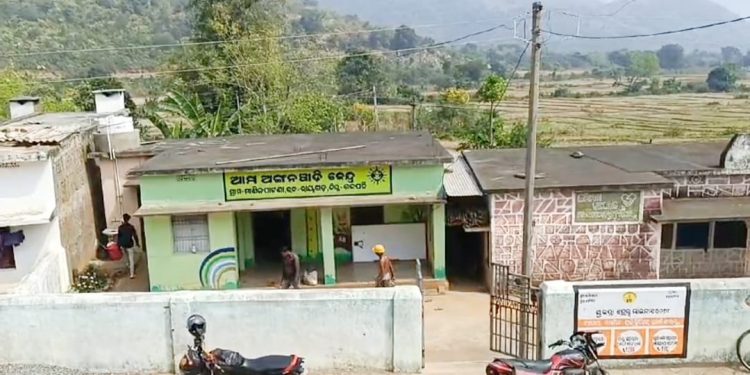Paralakhemundi: Manikapatna village under Rayagada block of Gajapati district has become a point of contention between Odisha and Andhra Pradesh, with two Anganwadi centres (AWCs), one from each state, operating in the same village.
The border panchayat of Gangabada, which has long been embroiled in territorial disputes, is witnessing intensified efforts by Andhra to establish its influence.
The neighbouring state has continued its aggressive efforts, taking every possible step to win over locals through various welfare schemes. Taking advantage of administrative lapses, the Andhra administration has extended its activities into Odisha’s territory, constructing and operating an Anganwadi centre despite legal and jurisdictional objections.
Also Read: EPF benefits soon for ASHAs, AWC, MDM workers
Local sources reveal that the Andhra government initially operated the centre from a resident’s house with the help of Srikakulam administration, but later constructed a permanent structure forcibly on a disputed village land and has been operating it from there.
Despite Odisha’s objections, Andhra remains steadfast in its activities. Previously, it had attempted to implement infrastructure projects, conduct administrative operations, and even hold elections in the region.
Though these attempts were thwarted, the state has now resorted to threats. Andhra officials reportedly issued warnings to close Odisha’s operational Anganwadi centre and arrest its officials. Additionally, a former Andhra minister even threatened to demolish the existing Odisha government properties in minutes. Chatters were abuzz in the whole country after the warning of the former Andhra minister was published by various sections of the media.
While Odisha continues to protest these activities, Andhra Pradesh has accelerated its developmental projects in Manikapatna and nearby Gudukhudi, local sarpanch Haribandhu Karji alleged. Reports suggest that Andhra’s administrative officials are planning to grant permanent land rights to residents and are collecting applications from locals to include them in housing schemes.
Karji has condemned the actions of the Andhra Pradesh government, alleging that the neighbouring state is attempting to solidify its influence by providing government benefits to residents of the disputed region. Despite the ongoing conflict, the residents of the area remain beneficiaries of schemes from both states, reflecting the complex administrative struggle over territorial control.
Residents in the border areas of Odisha are increasingly drawn to Andhra’s welfare initiatives as the neighbouring state continues to strategically expand its influence. By providing consistent supplies of food, milk, and eggs through Anganwadi centres, Andhra has managed to attract the locals.
According to Karji, both state governments are implementing their respective welfare schemes in the region, and residents are benefiting from both sides. Andhra Pradesh’s Anganwadi centres reportedly provide higher-quality food than those in Odisha, including daily servings of eggs and milk for children.
Furthermore, due to the lack of hostel facilities in Odisha, several students have chosen to reside in Andhra for their education, Karji said. He added that Andhra has been operating the Anganwadi centre in the area for the past 14 years, offering both education and essential amenities. Consequently, some locals are inclined to align themselves with Andhra Pradesh.
With the Bharatiya Janata Party (BJP) in power both at the Centre and in Odisha, as well as in Andhra Pradesh through a coalition, residents and local representatives are calling for a permanent resolution to the ongoing border dispute. They demand that both governments take necessary steps to address the conflict and ensure a stable and lasting solution.
When contacted, Additional District Magistrate (ADM) Rajendra Minz said that necessary steps will be taken soon to address this problem.
PNN






































